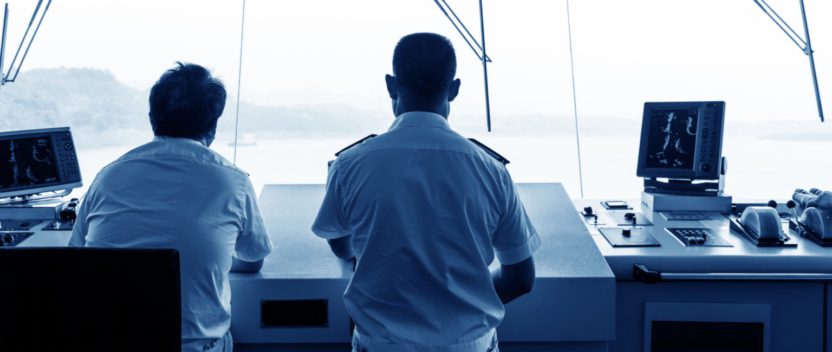It’s not about the ship
In taking the stage at the recent DigitalShip Two conference in Singapore, Anwar Siddiqui of Saudi shipping company Bahri made a brave admission. This keynote speaker had just two years in shipping – in addition 20 years devising data and technology solutions in the software domain.
It must have been an interesting two years for Siddiqui, who acts as Advisor to the CEO and is in charge of one of the largest big data projects run by a single company. The early results, he suggests, point to a future in which shipping moves past the current focus on big data from the vessel to a much more holistic data-driven business model.
Proposing that shipping’s future will no longer be about picking up cargo at point A and discharging it at point B, he listed the industries – telephony, mapping, information search, transport, media and money, that had either been transformed by the digital economy or are in the process of doing so.
“Shipping has changed but ships generating data is not new. We generate terabytes of data at Bahri but it’s really not about getting the data, it’s about the insights to be mined and the decisions to be made,” he said. “We are students of data science, we have to computationally decide how to use and present the data to decision-makers, which could be the charterer, voyage manager, master or crew. All of them can be aided by data science.”
The amount of data points available daily in shipping could be between 110 and 120 million but how much cannot really be known. And because it is not humanly possible to know them all, it could be half that number or more, he said.
It is the process of analysing the data that brings out specific insights, knowledge or the ability to make forecasts with a confidence level attached. And he says shipping is well positioned. Compared to media and services, retail, education or healthcare, shipping is rich in volume, variety and velocity of data.
“The opportunity is there to achieve better revenues, better rates, improve customer service. Data drives decision making but it’s not just about looking at charts. Now, if we need to make a decision about the cargo or the ship we can make a recommendation based on the data available,” he added.
There are plenty examples of studies that claim data-centric companies can have a better bottom line than their peers and that those with operations centres do likewise but as Siddiqui said it comes into its own when facing political or economic Black Swan events such as Brexit.
“If we make decisions based on forecasts from the data in the business plan, how come we still end up in the gutter? Because Brexit can never be in your forecast. Taking a ‘lock and load’ decision is old. Data science can tell you every day what’s going on and based on that how to engage with the market.”
The problem with an inflexible strategic model is that top management make decisions on when to buy or build a vessel but it is left with the operations department to figure out how to run it so that the projected numbers are achieved. Shipping he said is prone to ‘making one decision and hoping for the best’ instead of taking feedback into its decisions and adjusting them as necessary.
Bahri’s solutions are a ‘data lake’ which house the massive amounts of internal, operational and customer data which can generate patterns on a ‘data grid’ that can be used for decision support.
The users can attach confidence levels to the decisions they make because the data is based on a combination of human experience and machine learning; the user concerned knows that the data in the system may not always be the most applicable for a particular situation.
Being able to access a combination of structured and unstructured data from private and public sources feeds into events such as port calls and congestion, next available cargoes and destinations. The decisions are made on the basis of market sentiment analysis and the results should be greater efficiency and improved customer relationships.
“Using techniques like natural language processing, Artificial Intelligence and machine learning, there is the potential to improve the business model. As a shipping company, you are able to much better judge the return on capital employed and I would argue that by pushing down path of innovation we can map that efficiency into our top and bottom lines,” he said.
Siddiqui went so far as to say that data is not the differentiator for Bahri; the importance comes from the action it is able to take. “Everybody has access to Google and email but not everybody uses it the same way. Do you change or do you stick to the old guard?”
The next stage is more problematic but – in common with other incomers to the territory – challenges the traditional ‘zero sum game’ business model of competitive shipping.
Instead of customer and supplier trying to beat each other continually, they should be thinking about how to collaborate more closely. This means neither handcuffs nor a free-for-all but a system where there is a dynamic market response based on data, he suggested.
Some data might still be guarded but decisions could be shared. The companies that decide to participate in an ecosystem would be able to benefit from a holistic solution and by doing so results are improved for both, he suggested.
The ecosystem part needs some work, Siddiqui admitted and there should be careful selection of the partners to work with but there is positive momentum and nascent interest to build up an ecosystem capability in the maritime sector.
“A lot of shipping companies know the potential exists but they are nervous about sharing. A big data ecosystem and decision-making engine is where the value will be created and the winners and losers separated out. Opposing transparency is fighting against the grain. People enjoyed life before the internet but is that where we want to go back to?”


